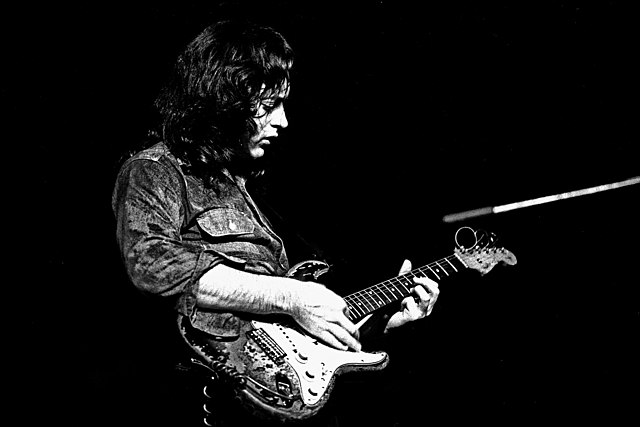Find out more about The Open University's Arts and Humanities qualifications.
“In an Irish Tour, I always try and include Belfast and the north of Ireland. After all, I lived there for a while and I learned a lot playing in the clubs there, so I have a certain home feeling for it. It’s always a great audience there. Pretty much almost no one else goes to play there.”
Rory Gallagher, Irish Tour ’74 documentary
Throughout the 1960s, Belfast was Ireland’s “rock capital”, with a beat music scene centred on the city’s Maritime Hotel and an annual arts festival attracting the likes of Jimi Hendrix, John Lee Hooker and Ravi Shankar. When The Troubles broke out at the end of the decade, this vibrant musical ecosystem started to suffer. Although bands continued to perform, many international artists became reluctant to play in Belfast and no longer included the city in their tour schedule. A notable exception to the rule was Rory Gallagher.
Born in Donegal and raised in Cork, Rory Gallagher (1948-1995) was a blues musician who was part of the power trio Taste and went on to have huge solo success over a career spanning three decades. Gallagher had moved to Belfast in 1967, securing a residency with Taste at the Maritime, where his electrifying live performances quickly turned him into a local treasure.
Even when the band relocated to London in summer 1968, Gallagher would continue to describe Belfast as his second home and felt a special connection to the city. Therefore, throughout The Troubles, he was adamant that it would remain part of his annual Irish Tour. Gallagher repeatedly played down the significance of his act, arguing that he did not “see any reason for not playing Belfast,” but it was something that meant a great deal to Belfastians.
Gallagher won fans on both sides of the debate as he constantly refused to be drawn publicly into political and religious commentaries, despite his strong personal feelings about Ireland. His now-legendary concerts at Belfast’s Ulster Hall, therefore, became a liminal space that brought people from all backgrounds together.

Rory Gallagher on stage in Hamburg, 1971, photograph by Heinrich Klaffs, CC-BY-SA
A review in Melody Maker (8 January 1972) shortly after Gallagher’s 1971 Christmas concert captures the power of his music to unite Belfast:
I’ve never seen anything quite so wonderful, so stirring, so uplifting, so joyous as when Gallagher and the band walked on stage. The whole place erupted, they all stood and they cheered and they yelled, and screamed, and they put their arms up, and they embraced. Then as one unit they put their arms into the air and gave peace signs […] You just wanted to take the lid off the walls from around this hall and put it on a huge platform, raise it above the city and let just everyone see it, and hear it. Two thousand people together as one, with no minority, no troublemakers, no inhibitions.
Through his concerts, Gallagher created solidarity between diverse communities. While concepts of Irishness could be extremely divisive outside of the Ulster Hall, within, a different type of Irishness was encouraged. An Irishness that was not bound with politics or religion, but was fluid and heavily anchored in music and collective memories, enabling all other connotations to be temporarily suspended.
The importance of Gallagher’s music to Belfast is best captured in the documentary Irish Tour ’74. His performance of ‘Goin’ to My Hometown’ juxtaposes footage of everyday life in Belfast with jubilant scenes inside the Ulster Hall as people on both sides of the debate come together and sing. It is also accompanied by a voiceover from Gallagher stating how much Belfast means to him. The powerful clip shows how music can create “amicable cross-community interactions”, bridging the sectarian divide and building a new sense of identity. It also indicates Gallagher’s pride in Belfast, as well as his strong propensity to non-conform by choosing to play there. For Gallagher, music was not about fortune or fame, but doing what he thought was morally right for his fans and the Belfast community.
Today, a plaque on Ulster Hall marks Gallagher’s many performances there, while a statue for him has been called for and has achieved a lot of public support. Comments on YouTube also show the high esteem in which he is still held in the city, with Belfastians frequently praising his ability to provide healing with his music. “RIP Rory, you brought our community together through the bad times,” reflected one fan poignantly.
In November 2021, Belfast was declared a UNESCO City of Music in honour of its “rich musical heritage”—only the third city in the UK to receive the accolade. Gallagher’s role in this rich musical heritage should not be underestimated. Through his concerts, he brought happiness and hope to young people during a time of despair, demonstrating the strength of music as a unifying force that transcends boundaries and difference.
Rate and Review
Rate this article
Review this article
Log into OpenLearn to leave reviews and join in the conversation.
Article reviews